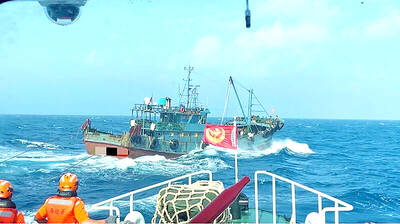US President Joe Biden on Thursday signed an order to amend a ban on US investment in Chinese companies begun under former US president Donald Trump, naming 59 firms with ties to China’s military or in the surveillance industry, including Huawei Technologies Co (華為) and the country’s three biggest telecommunications firms.
The ban on new investments is to take effect on Aug. 2 at 12:01am in New York, said administration officials, who briefed reporters on condition of anonymity.
Investors will have one year to fully divest, the officials said.
Biden’s order is largely a continuation of a policy issued by Trump. Biden’s position on Trump’s order has been closely watched by Wall Street and Capitol Hill, where lawmakers have called for a strong stance against China over issues ranging from trade to human rights.
Many of the companies in Biden’s order were already on the Trump administration’s list, including the nation’s largest telecoms — China Mobile Communications Group Co (中國移動), China Unicom Ltd (中國聯通) and China Telecommunications Corp (中國電信) — as well as top chipmaker Semiconductor Manufacturing International Corp (SMIC, 中芯) and server maker Inspur (浪潮).
Among the defense companies on Biden’s list are Aviation Industry Corp of China (中國航空工業), which is one of the best known of the Chinese military giants; China North Industries Group Corp (中國北方工業集團); China Aerospace Science and Industry Corp (中國航天科工集團); and China Shipbuilding Industry Co (中國船舶重工集團公司).
Biden’s list also includes Hangzhou Hikvision Digital Technology Co (杭州海康威視數字技術), a developer of surveillance cameras and facial-recognition technology that has helped Chinese authorities roll out “safe city” initiatives in Xinjiang, where ethnic Uighurs have allegedly faced persecution.
Companies on Biden’s list that were not covered in Trump’s initial ban include Zhonghang Electronic Measuring Instruments Co (中航電測儀器) and Jiangxi Hongdu Aviation Industry Co (洪都航空工業集團).
Shares in the targeted firms were a mixed bag yesterday morning in Asia. Hangzhou Hikvision was little changed after sliding about 2.2 percent, while SMIC fell as much as 3.3 percent in Hong Kong.
The US Department of the Treasury released guidance on the penalties later on Thursday.
The department is to update the list on a rolling basis, one of the officials said.
A Hangzhou Hikvision spokesperson said in a statement that “with no justification for previous lists, the US government keeps finding creative ways to continue targeting Hikvision simply because we happen to be headquartered in China.”
Under Biden’s order, the investment prohibitions will apply to subsidiaries of companies only if they are listed by the department’s Office of Foreign Assets Control.
The amended order clarifies that the measures will no longer apply to companies whose names closely match the listed entities, the Biden administration officials said.
The assets office’s list will be coordinated with the US departments of state and defense. The Pentagon, which is required by the US Congress to keep a list of companies linked to the Chinese military, released its list on Thursday.
Some companies will be listed by the Pentagon and the assets office, the officials said.
The amendment to Trump’s order comes after two Chinese companies successfully challenged it in US court.
Biden’s team said that a revision was necessary to ensure it was legally sound and sustainable in the long-term.

MILITARY BOOST: The procurement was planned after Washington recommended that Taiwan increase its stock of air defense missiles, a defense official said yesterday Taiwan is planning to order an additional four PAC-3 MSE systems and up to 500 missiles in response to an increasing number of missile sites on China’s east coast, a defense official said yesterday. The official, who spoke on condition of anonymity, said that the proposed order would be placed using the defense procurement special budget, adding that about NT$1 trillion (US$32,88 billion) has been allocated for the budget. The proposed acquisition would include launchers, missiles, and a lower tier air and missile defense radar system, they said The procurement was planned after the US military recommended that Taiwan increase

POLITICAL AGENDA: Beijing’s cross-strait Mid-Autumn Festival events are part of a ‘cultural united front’ aimed at promoting unification with Taiwan, academics said Local authorities in China have been inviting Taiwanese to participate in cross-strait Mid-Autumn Festival celebrations centered around ideals of “family and nation,” a move Taiwanese academics said politicizes the holiday to promote the idea of “one family” across the Taiwan Strait. Sources said that China’s Fujian Provincial Government is organizing about 20 cross-strait-themed events in cities including Quanzhou, Nanping, Sanming and Zhangzhou. In Zhangzhou, a festival scheduled for Wednesday is to showcase Minnan-language songs and budaixi (布袋戲) glove puppetry to highlight cultural similarities between Taiwan and the region. Elsewhere, Jiangsu Province is hosting more than 10 similar celebrations in Taizhou, Changzhou, Suzhou,

COGNITIVE WARFARE: Chinese fishing boats transmitting fake identification signals are meant to test Taiwan’s responses to different kinds of perceived incursions, a report said Chinese vessels are transmitting fake signals in Taiwan’s waters as a form of cognitive warfare, testing Taipei’s responses to various types of incursions, a report by the Institute for the Study of War said on Friday. Several Chinese fishing vessels transmitted fake automatic identification system (AIS) signals in Taiwan’s waters last month, with one mimicking a Russian warship and another impersonating a Chinese law enforcement vessel, the report said. Citing data from Starboard Maritime Intelligence, the report said that throughout August and last month, the Chinese fishing boat Minshiyu 06718 (閩獅漁06718) sailed through the Taiwan Strait while intermittently transmitting its own AIS

CHINESE INFILTRATION: Medical logistics is a lifeline during wartime and the reported CCP links of a major logistics company present a national security threat, an expert said The government would bolster its security check system to prevent China from infiltrating the nation’s medical cold chain, a national security official said yesterday. The official, who wished to stay anonymous, made the remarks after the Chinese-language magazine Mirror Media (鏡周刊) reported that Pharma Logistics (嘉里醫藥物流) is in charge of the medical logistics of about half of the nation’s major hospitals, including National Taiwan University Hospital and Taipei Veterans General Hospital. The company’s parent, Kerry TJ Logistics Co (嘉里大榮物流), is associated with the National Committee of the Chinese People’s Political Consultative Conference (CPPCC) and the Chinese People’s Liberation Army (PLA), the